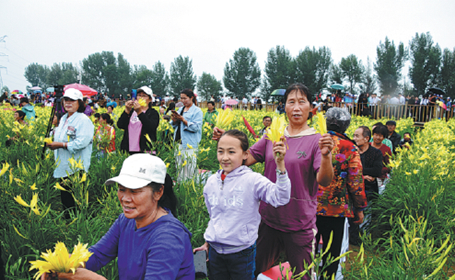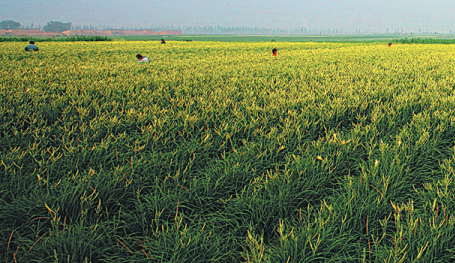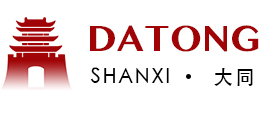Agricultural triumph blossoms in Shanxi

Tourists get hands-on experience with daylily harvesting on a farm in Datong's Yunzhou district. [Photo by Sun Ruisheng/China Daily]
Herb grown in province's Datong city becoming known for its quality
Daylily, a plant with beautiful blossoms and poetic connotations, is now seen as a source of pride, delight and hope by growers in the northern Shanxi city of Datong.
The plant has been chosen by Chinese poets throughout history because it is a symbol of love between children and their mothers.
The Book of Songs, or Shijing, a collection of poems compiled by Confucius more than 2,500 years ago, mentioned this herb by calling it worry-free grass.
Legends have it that when a son is about to leave his mother for a long journey, he would usually plant the herb in the courtyard, hoping to relieve the mother's worries about him when seeing its beautiful blossoms.
As its name suggests, the plant is relieving the worries of growers in Datong. It has now developed into a big industry worth millions of dollars and is a major source of revenue for farmers in the city.
Daylily, which is also known as yellow flower or golden-needle vegetable, is a popular food ingredient in China. It is also sought-after in Chinese communities in regions like North America and Europe.
Datong has a history of growing daylily that dates back 600 years. It is among the top four production bases for the herb in China. According to the Datong government, the city's planting area of the crop now accounts for about one-fourth of the country's total.
The daylily products from the city are renowned for their quality, thanks to local farmers' experience and the unique soil, sunlight and irrigation.
In recent years, the local daylily industry has expanded substantially due to authorities' efforts to drive modernization, promote branding and increase planting areas. Local statistics show that the total planting area of daylilies in Datong reached nearly 18,000 hectares in 2021, an exponential increase from just 1,000 hectares in 2010.
According to An Yiping, head of the Datong Center for Daylily Industrial Development and Services, the entire industrial chain of daylilies in the city is estimated to reach 4 billion yuan ($594.74 million) this year.
The local industry's strength is also represented by 109 villages specializing in plantation, 14 leading enterprises in processing, and six brands with nationwide recognition.

Datong has about 18,000 hectares of daylily farms, making it one of the top production bases of the crop. [Photo by Wang Zhongxun for China Daily]
The village of Tangjiapu in Yunzhou district is one of the major bases for the growth and processing of daylilies in Datong.
Local villager Yang Qi is one of the pioneers in Tangjiapu who helped the industry grow in both scale and strength over the past decade.
He founded a daylily-farming cooperative in Tangjiapu in 2011. That was among the earliest such cooperatives in Datong. The cooperative's initial stakeholders were 50 impoverished families who contributed their 33 hectares of land as the stake.
Now the cooperative has developed into a comprehensive enterprise for growing and processing daylilies and the sales of finished products.
The company, called Huaqingcheng, owns a daylily processing plant with a floor space of more than 6,000 square meters. It is equipped with two automatic production lines for finished daylily products.
"In addition to processing daylilies from our own farms, we also purchase produce from farmers in neighboring areas," Yang said. He added that the business revenue of his company reached 20 million yuan in 2021.
Tang Wan, a resident in Tangjiapu, is one of the suppliers to Yang's processing plant.
"My family earned about 50,000 yuan last year by selling daylilies to Huaqingcheng," Tang said. "That was a big part of my family revenue."
Tang added that the orders from Huaqingcheng are a driver for his constant revenue increase.
He admitted that sales are always the biggest concern of individual growers. He recalled that when he began to grow the crop in 2005, his family's annual income from growing daylilies was less than 2,000 yuan. "We didn't dare to expand the scale because we were not sure if we could sell all the produce."
Now that concern is being addressed by the company. Its success has led to increased orders made to farmers, Tang said. "Last year, I planted 2 hectares of daylilies. That was a 60-fold increase from what I began with."
Gou Chunwei, an official of the village, said a price hike also contributed to the growth in farmers' income.
"The price of fresh daylilies increased from 3 yuan per kilo in 2020 to 5 yuan last year," Gou said. "That meant a revenue increase of 2.98 million yuan for the entire village."
He noted that the prices of Datong-produced fresh daylilies grew at a rate much higher than the average in the domestic market, demonstrating recognition of the quality of Datong's produce.
An of the Datong Center for Daylily Industrial Development and Services said the city will further improve the industry's competitiveness through the use of smart operations.
Technological upgrades include installing automatic and digitally connected devices for soil condition monitoring, irrigation and fertilizing.
Other initiatives include promoting the branding of Datong-produced daylilies, according to Pang Youjun, head of the agriculture and rural affairs bureau of Yunzhou district.
He noted that Datong's daylilies were recently granted a geographical indication by an authoritative national organization. Also, Yunzhou district was recognized as a demonstration zone for the standardized growth and processing of the crop.
Han Linfang contributed to this story.


